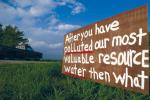
The debate over the cause of climate change has long been standing and many theories and statistics have been developed over the years in an effort to educate and correct the masses. Amongst which, one of the most popular cases involve animal farming and the pollution that it causes, which seems to exacerbate the effects of global warming. Not only is the United Nation in support of this theory, but a general belief that the government's share is that a global shift towards plant-based food is vital in order to combat the worsening effects of climate change on earth.
The earliest effects that animal farming seems to pose involves the massive amounts of natural resources that are required. Elements like water and grain are required to feed the animals before their eventual harvesting and killing which will further involve huge energy consumption. Not to mention, land has to be cleared in order to make way for the rearing of animal. This inadvertently causes a decrease in forests – the one source for absorbing greenhouse gases. Finally, the amount of manure and flatulence that animals produce are the primary cause for the huge amount of greenhouse gases found in our atmosphere.

On an average, it appears that a particular animal agriculture requires significantly more resources and produce more methane than other sources. Methane is particularly problematic because when compared pound for pound, methane is more than 25 times more effective than carbon dioxide at trapping heat in our atmosphere. Beef or cows require around 28 times more land and more than six times the amount of fertilizer in order to rear and kill. As such, if you plan to cut down on your consumption of animals, you could begin with limiting your intake of beef.
Last but not least, nitrous oxide which is yet another potent greenhouse gas is more than 300 times more potent than carbon dioxide and accounts for more than 65% of worldwide nitrous-oxide emissions. Majority of the nitrous oxide emissions don’t come from livestock themselves, but rather arise from the animal wastes that occur during the storage and treatment of it. On top of that, the initial production of livestock feed produces a large amount of nitrous oxide and potential for control of it is extremely limited.
As humans, we should all take up the stand against reducing greenhouse gases in the environment. By reducing your consumption of animal products, or even turning vegan, we are essentially taking a powerful step towards the reversal of climate change. It is almost impossible to reverse climate change through the reduction of greenhouse gas produced from alternative sources like vehicles. Instead, effort has to be made in the reduction of animal farming and burning of fossil fuels in order to combat pollution and global warming. Should we continue down this path of increased animal farming and pollution, it can almost be assured that the future generations will not be able to sustain themselves on this planet.